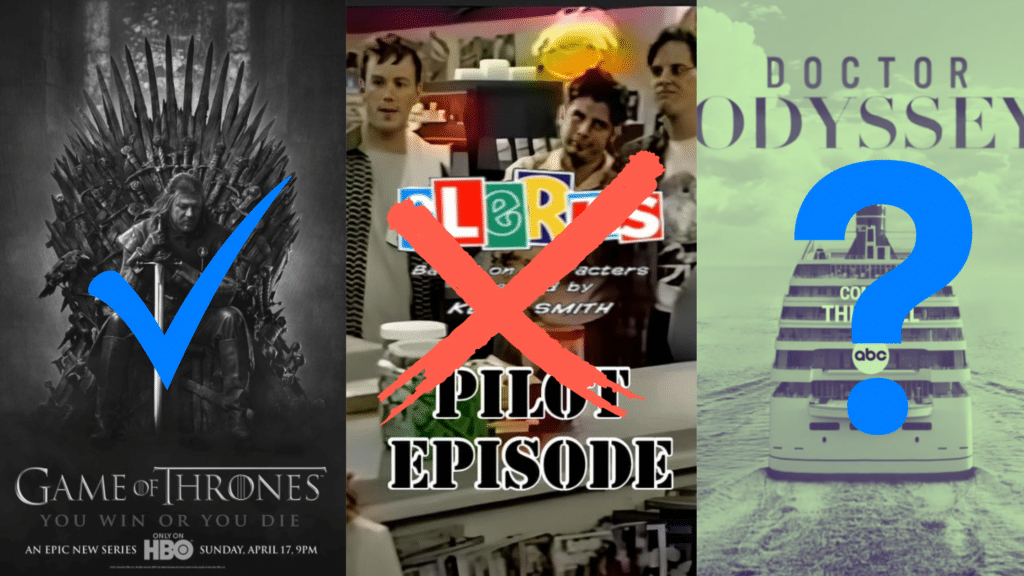
Introduction
Television has taken the ball and is running with it full pelt. With countless new shows announced every year and the rise of streaming services over the past decade, we are watching more television than ever. In fact, this study from Statista suggests U.S. adults will, on average, watch three hours of television per day in 2024!
But what makes a TV pilot tick? Which ones are successful, and why? Which ones fail to inspire audiences, and why?
In today’s article, we’ll be getting under the skin of the TV pilot and discovering exactly what’s in the DNA of some of the world’s most successful shows. Get your scalpels ready, it’s going to get messy.
What is a TV pilot?
So why is the first episode of any TV show called a ‘pilot’? The term is actually based on a scientific reference to a small-scale, early-stage study to determine the feasibility and cost of the project in its entirety.
After all, the film industry is big business, so studios want to ensure that the investment in a show will bring a healthy return. A pilot episode showcases the potential of a show and how it could come to life on screen.
For the major TV networks, most pilots will be released during ‘pilot season’, which runs from January until April or early May each year. It’s a busy time in the industry calendar, with pilots being produced and reviewed, with crucial decisions being made on their futures.
The schedule for streaming services like Netflix, Disney, Hulu, and Amazon works differently, with concepts constantly being developed and green (or red) lit all year round.
If a pilot is greenlighted, it will then serve as the series premiere, and aired to audiences, unless major changes and reshoots need to happen. This happened with Game of Thrones; most characters were recast and the pilot reshot after a disastrous first cut.
Anatomy of a Successful Pilot
Whether it’s a drama, comedy, thriller, horror, or anything in between, all pilots must draw an audience in and leave them wanting more. As with all shows, it starts with the script and a story that jumps off the page.
So, what do you need to craft a killer pilot?
A Provocative Premise
Every pilot should establish a strong premise that will hook both executives and an audience. While a pilot should be its own self-contained story, you want viewers to easily envision a future for the show, its world and its characters.
A Winning World
Creative world-building is key to immersing your audience in the story and intended genre. Does the world exude drama, comedy, thriller, etc? Does the world possess clear rules, conventions and values that an audience could identify later?
Thrilling Theme
All pilots must know what they’re about and the message they’re trying to send. While the theme will be constantly developed throughout a series, the pilot must hit the ground running, giving audiences a clear idea of what it’s all about.
Compelling Characters
At the center of the world are the characters, the people your audience will follow on a journey. Characters need to be believable and relatable in one way or another. Who are these people and what makes them tick? Will we want to stick with them as they move through the series?
Pilots that didn’t make the cut
There are many famous examples of pilots that didn’t make it to a series. Let’s take a look at some of those and consider why they fell at the first hurdle.
Aquaman (2006)

The idea for an Aquaman series stemmed from the Superman show Smallville. After Aquaman appeared in an episode named “Aqua”, the creators Miles Millar and Alfred Gough felt confident the character could have their own spin-off.
A pilot was filmed, and a buzz began to surround its release, with fans in high anticipation. Ultimately, the show was passed by the CW network, and it was left to Millar and Gough to independently release the show on iTunes for an eager audience.
Ironically, the show reached the number one spot on iTunes in July 2006 with highly positive reviews. With further releases on other platforms to follow, it’s a surprise that the show was never picked up for a full series.
So, you’d think the pilot wasn’t good enough… well, no. It was well written, with clearly established characters and world. Gough spoke to WizardUniverse.com in 2006, at a loss as to why The CW didn’t pick up the show.
The implication when a network doesn’t pick up a show is that the pilot sucks and that’s not the case. It’s not a perfect pilot by any stretch of the imagination. There are other reasons—which are a mystery to us—as to why The CW didn’t pick it up.
Aquaman is a prime example of a show that goes to TV heaven without a clear explanation. The TV industry can be a mysterious one, where the reasoning behind network decisions is never revealed. What is certain is networks are a business, and perhaps Aquaman just wasn’t a smart business decision at the time.
Swamp Thing (2019)
Unlike Aquaman, Swamp Thing’s pilot did make waves, and the series was picked up and 10 episodes were aired. Another installment in the DC Universe, Swamp Thing follows Dr. Arcane as she investigates a swamp-borne virus in her hometown. Her disgraced associate Alec Holland mysteriously dies in the midst of their research.
The 10-episode series received praise from critics and viewers. Again, the pilot set a compelling scene with the swamp and Dr. Arcane’s scientific world, establishing clear relationships between her and the other characters. Everything was going to plan until…
The show’s production was halted due to creative differences between the production company and WarnerMedia, the DC Universe’s parent company. Immediately after the pilot was aired, what was originally meant to be 13 episodes was cut to 10.
The creative differences in question were never expanded upon, with one of the show’s stars, Derek Mears, speaking to Collider.com about the disappointment:
“It was such a heartbreaker to find out after our first episode that we got canceled for the second season, but all we’ve heard up until that point was how amazing everything was. And everyone’s going, “We have a big hit on our hands. This is crazy.” … So it’s a weird nebulous space that we’re all in now because we don’t know officially why that would happen, or why they cancelled it. Even if you are going to cancel it, wouldn’t you wait until later on until to see how it plays with fans before? So, something’s going on somewhere.
Similar to Aquaman, the nitty gritty circumstances surrounding Swamp Thing’s cancellation are unknown.
Clerks (1995)
Let’s not confuse this pilot with its highly successful movie counterpart. After the success of the indie comedy Clerks one year earlier, the natural next step seemed to be to create a complementary TV series.
The doomed pilot centred around two convenience store workers trying to do not very much at all. Everything about the pilot seemed off, with strange casting for the two leads, terrible jokes, and a laugh track that just didn’t land well. The original movie was presented in black and white, with the pilot in stark color, which again put viewers off.
The most notable difference between the movie and the TV pilot was that the creators of the movie weren’t involved in the production of the pilot. Disney had bought the IP, with the movie cast and crew busy on another project. Additionally, the two movie lead characters, Jay and Silent Bob, were still owned by Kevin Smith, the brains behind the original. The characters that the audience had fallen in love with in the first place were nowhere to be seen in the TV pilot.
While the Clerks pilot helped kickstart many careers, it paved the way for the animated series, which hit screens a few years later.
If there’s one lesson we can learn from Clerks, it’s that there are stories we are meant to tell. The most important part of a project is the creative team behind it!
Success Stories
Reams of TV pilots are made every year, and only a select few make it onto our screens. Even if they do make it, it’s not always an easy ride. It’s time to explore those series that are now huge hits, but almost didn’t get made!
Game of Thrones

We mentioned this HBO classic earlier on in the article, and now it’s time to return to Westeros to explore just why we almost didn’t see the houses of Lannister, Targaryen, Stark, Baratheon, Tyrell, Greyjoy, among others, battle it out for the mighty Iron Throne.
It took over 15 years for showrunners David Benioff and Dan Weiss to pull the show off. The first four years were a struggle to even get the show going. Both were fresh showrunners, having never produced a series of this scale before. Even the most experienced of the early cast and crew felt out of their depth. Iain Glen, who played Jorah Mormont described the initial shoot as:
…a bit ragged and, in some ways, ill-conceived, and no one had great conviction.
After a painful first shoot, Benioff and Weiss showed the pilot to friends and family. It received a muted reaction, the words ‘boring’ and ‘small scope’ coming to mind. HBO felt the overall production value didn’t match the sheer scale of George RR Martin’s original novels.
The genre depicted in the pilot also seemed confused. While the novels exuded drama peppered with supernatural magic, the pilot seemed more like a period drama and didn’t make much sense, as writer Bryan Cogman explained to Entertainment Weekly:
Key exposition was cut to make the dialogue sound more “real,” and as a result, the pilot didn’t make much sense. The impulse to not be over-the-top Shakespearian and Tolkien-esque was right—you’re trying to make it as grounded as possible—but this is still an epic fantasy, and if you ignore that, it’s to the detriment of your story.
After much discussion, it was decided the pilot needed to be rethought and reshot, with some characters being recast. HBO took a chance on Game of Thrones, and it paid off. It just goes to show that genre and theme are key components in a pilot and should be at the forefront of a writer’s mind.
Breaking Bad
One of the most groundbreaking series of the 21st Century, it’s hard to believe that Breaking Bad almost didn’t make it. But it’s a fantastic showcase of how important a writer is to their story. When creator Vince Gilligan first pitched the series to studio executives, they compared it to a series called Weeds, a new Showtime series about a mom who throws away her normal life to deal pot.
While the premises of Breaking Bad and Weeds sounded nearly identical, they couldn’t have turned out more different in their tone and execution. Weeds went down the comedy route, while Breaking Bad incited gritty realism. You tell us which one you remember more! The success of the series proves Gilligan was the right person to execute Breaking Bad, and arguably, the only person who could make it what is now is – a classic!
Conclusion
The success of a TV pilot often depends on a combination of factors, from strong storytelling and compelling characters to the timing and vision of its creators. While some pilots never make it to air despite their potential, others—like Game of Thrones and Breaking Bad—prove that persistence, creative direction, and understanding genre can turn a struggling pilot into a cultural phenomenon. The unpredictable nature of the TV industry ensures no formula guarantees success, but one thing is clear: a great pilot can set the stage for an iconic series.
About to start writing your own pilot? Check out our article here for top tips and advice on writing a killer show!
We’d love to hear from you! Which series drew the short straw and deserved their shot at notoriety? Head on over to our socials and join the conversation.

